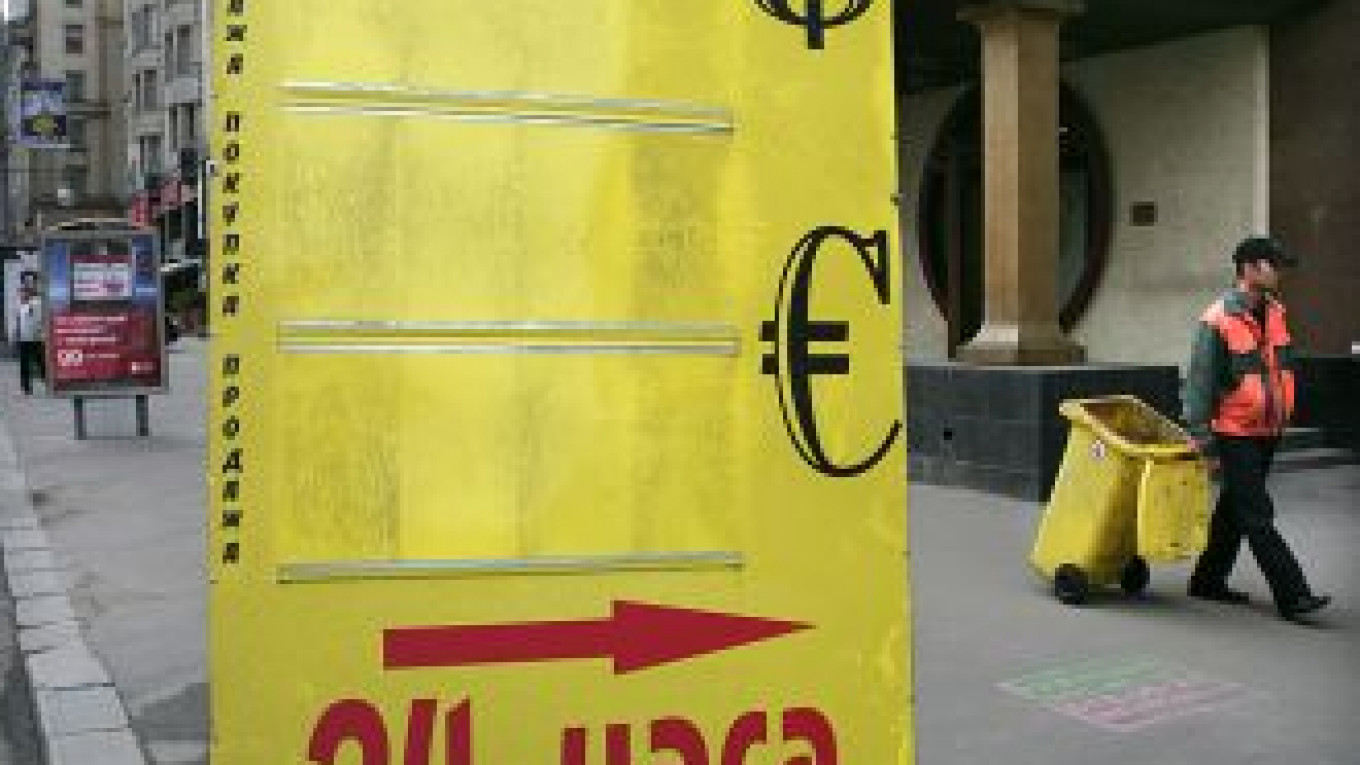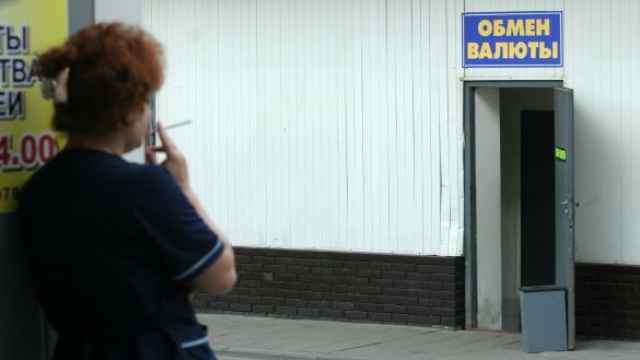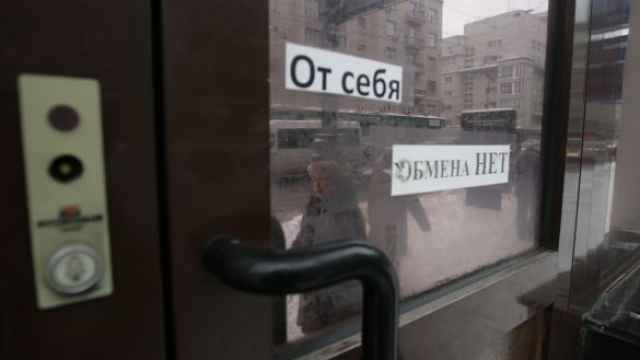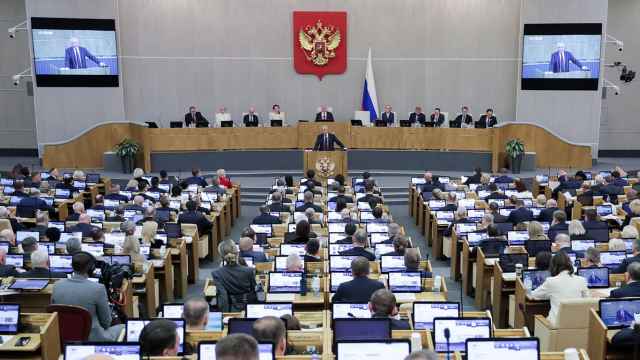A dark booth. A hole in the wall. Or just a window next to a casino door.
It was inside these currency exchange booths where Russians first traded rubles for American dollars in post-Soviet days. Now, as the government carries out its long-time plan to shut the last of the standalone booths, with the Central Bank making them illegal this past Friday, Muscovites have mixed feelings about their disappearance.
The booths have offered convenience and competitive rates. But with dirty interiors, snarling clerks and the occasional con artist, obmenniki, or exchangers, also have offered a customer experience that’s hard to forget.
Even a famous face won’t help you there. Alexander Zbruyev, a renowned Russian actor, had an unpleasant encounter a few years ago at a booth on Tverskaya Ulitsa, where fellow customers urged him to the front of the line, only to watch the cashier slam down the teller window. Customers begged her to let the popular star change his money, but to no avail. She took her lunch break.
“As a person who is well aware of security measures, I was often reluctant to visit them, so I have done all my exchanges through the bank, using a telephone,” recalled Iosif Prigozhin, a major producer for recording artists. He recalled that many of the exchange booths operating in 1990s Moscow were “surrounded by petty criminals,” men who were “hanging around.”
Prigozhin’s brother was a victim of lomshchiki, criminals who con people into forking over their cash in return for banknotes covering a pile of scrap paper.
It was a common swindle. In 1999, Justin Lifflander, who’s now the deputy business editor for The Moscow Times, changed money with the help of a man who offered to buy his dollars at a good rate.
“What was supposed to be about 2,500 rubles was really three 100 ruble notes, wrapped around a wad of a dozen 10 ruble notes. It was the worst rate I had ever gotten,” Lifflander said.
The booths’ workers themselves often were victims of criminals and sometimes were robbed in broad daylight. According to Moscow police, one exchange booth on Leninsky Prospekt was robbed 12 times in the course of just a few years.
While booths sometimes have been tied to criminal activity, they also have played an important role for consumers and the economy. “They have made the majority of Russians follow the currency rate and understand the process of valuation and devaluation,” Ivan Starikov, a deputy economic minister for agriculture under President Boris Yeltsin, told The Moscow Times.
Cropping up after the Soviet Union’s end, the standalone booths mushroomed into the thousands in the late 1990s, as Russians avoided the unstable ruble and sought to preserve their earning power by converting cash into dollars.
In the past 10 years, however, the government has made retail in dollars illegal, the banking system has strengthened and Russians have regained faith in their currency, making the gypsy exchangers less necessary. The Central Bank stated its plans to close down the standalone booths earlier this year, citing the need to protect consumers, but it was following the curve.
Just 700 foreign currency exchange booths remained nationwide in February, the Central Bank said at the time, as it detailed plans to close exchangers not associated with banks. Last week, there were just 140 of them, Interfax reported, citing the national bank.
“The exchange booths played the role of a shadow forex market,” said Mark Rubinstein, a senior banking analyst with Metropol. During the 1990s, the exchange booths provided an alternative to the few existing banks, he added.
“Today, those two factors are not important anymore,” Rubinstein said. He said he himself was often reluctant to exchange money in the booths. “I like facilities that have enough light,” he said.
His feelings are shared. In a survey released Thursday by jobs portal Superjob.ru, about 40 percent of the 1,800 Russians polled welcomed the closure of the exchange booths.
But 18 percent of respondents disagreed with the idea of shutting down the free-standing booths. They said exchange booths are more convenient than banks, since there are more of them and they have longer working hours.
The scene at many of Moscow’s exchange booths was unchanged Monday despite the ban, as the businesses found creative ways to adapt.
But some customers and workers were still upset by the Central Bank’s move. “This is a terrible decision. Where will I change money at night?” Yekaterina, 22, asked on Friday as she stood with her boyfriend near a booth at Moscow’s Savyolovsky train station.
The clerk behind the window told The Moscow Times to address all questions to her superiors.
“I won’t say anything except what people should be left without a job?” she said through tears.
Standing nearby, the owner of another booth said he runs “an operational cash office, not an exchange office,” though the nameplate on his booth said otherwise.
The owner was referring to the fact that the Central Bank will allow standalone booths to stay in business if they offer banking services. More precisely, booths need to become subdivisions of a bank to stay open, Interfax reported.
Today, bank branches number 24,500 nationwide, Interfax said.
Mikhail Delyagin, a noted economist, welcomed the government’s decision to “civilize” the currency trade.
Novelist Sergei Shargunov said exchange booths agreed with the 1990s, but he welcomed their close. “It is like buying homemade pies on the street. You can be filled up or be poisoned,” he said of the swindle-prone exchanges.
“Those booths looked like some kind of hole, both delightful and ominous, but it is good that they have been walled over,” he said.
Moscow Times intern Alexandra Taranova contributed to this report.
A Message from The Moscow Times:
Dear readers,
We are facing unprecedented challenges. Russia's Prosecutor General's Office has designated The Moscow Times as an "undesirable" organization, criminalizing our work and putting our staff at risk of prosecution. This follows our earlier unjust labeling as a "foreign agent."
These actions are direct attempts to silence independent journalism in Russia. The authorities claim our work "discredits the decisions of the Russian leadership." We see things differently: we strive to provide accurate, unbiased reporting on Russia.
We, the journalists of The Moscow Times, refuse to be silenced. But to continue our work, we need your help.
Your support, no matter how small, makes a world of difference. If you can, please support us monthly starting from just $2. It's quick to set up, and every contribution makes a significant impact.
By supporting The Moscow Times, you're defending open, independent journalism in the face of repression. Thank you for standing with us.
Remind me later.






